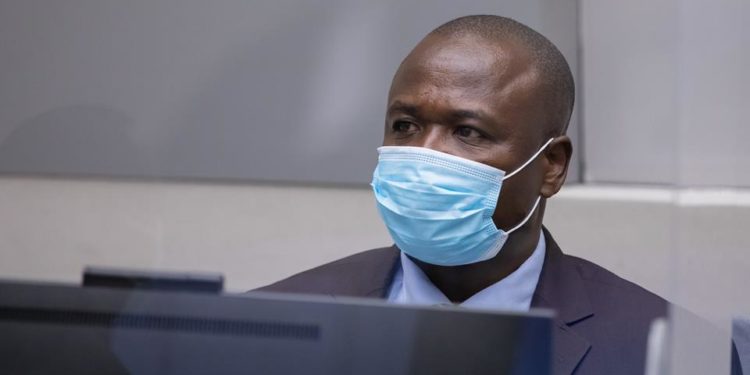By Susan Kendi
Former Lord’s Resistance Army Commander Dominic Ongwen is guilty of 61 of the 70 counts of war crimes and crimes against humanity he had been accused of, the International Criminal Court has ruled.
Ongwen was convicted of murder; attempted murder; torture; enslavement; destruction of property; pillaging; conscription of children under the age of 15 years to actively participate in hostilities; and sexual and gender-based crimes including rape, torture, and forced pregnancy and marriage.
The ICC Trial Chamber IX found that Ongwen had committed the offences after leading attacks on civilians in Pajule, Odek, Lukodi, and Abok camps for internally displaced persons (IDPs) in northern Uganda between July 1, 2002 and December 31, 2005.
Presiding Judge Bertram Schmitt and judges Péter Kovács and Raul Cano Pangalangan made the ruling after hearing the case for more than five years.
This is the first time the ICC has convicted an individual for forced marriage and forced pregnancy as war crimes and crimes against humanity. Ongwen was acquitted of nine counts of war crimes and crimes against humanity; cruel treatment; and inhumane acts. The prosecution and defence may appeal the verdict within 30 days.
Judge Schmitt read the summarised findings and insisted on calling out the name of each victim.
“Let me emphasise that it was difficult for the chamber to ascertain the names of every victim of the 70 crimes. Yet, in many cases, the chamber was able to do so. These victims have a right not to be forgotten; they have the right to be mentioned explicitly today as they are in the judgement as well. Please bear with me if I pronounce names incorrectly,” he said.
The Ugandan government created the IDP camps to protect civilians from LRA attacks. The Uganda People’s Defence Force (UPDF) and local defence units (LDU) consisting of men and youths provided security to the camps, which were disbanded after the LRA left northern Uganda in 2006 as part of the conditions for the peace talks.
Dominic Ongwen was himself a victim of the LRA, abducted when he was nine or 10 years old. He quickly rose through the ranks, becoming a battalion commander, then a senior commander in the Sinia Brigade. He had 700 soldiers under his command. The other LRA battalions were Stockree, Trinkle, Gilva, and Control Alter.
ICC Prosecutor Fatou Bensouda hailed the ruling, saying, “It is my sincere hope that this trial and verdict will strengthen the collective resolve of the international community to end impunity for atrocity crimes, including sexual and gender-based crimes and crimes against and affecting children so prevalent in conflicts around the globe. There must be accountability for the perpetrators.”
Trial Chamber IX acknowledged that Ongwen had experienced much suffering in his childhood and youth, adding that the judges would evaluate this in a later context.
“This case is about crimes committed by Dominic Ongwen as a fully responsible adult and as a commander of the LRA in his mid-20s,” Judge Schmitt said.
Ongwen’s lawyers have in the past argued that he was mentally unfit and that he committed the crimes under duress. They asked the court to dismiss 62 of the 70 counts that Ongwen was facing. However, Trial Chamber IX said LRA leader Joseph Kony and other commanders repeatedly applauded him for his “good” work.
“Dominic Ongwen is fully responsible for all the crimes found by the chamber. The chamber did not find any evidence that supported the claim by the defence that Dominic Ongwen suffered from any mental disease or disorder during the period of the charges, or that he committed these crimes under duress…” read Judge Schmitt.
“The overwhelming evidence paints a picture of Dominic Ongwen as a person in full possession of his mental abilities. His subordinates described him as an extremely capable fighter and commander. He planned his attacks carefully and assessed the risks together with his officers.”
In line with social distancing requirements due to Covid-19, there was only one person per the three-seat parties’ and participants’ table. The prosecution team, led by Bensouda, had representatives in the courtroom. The lead defence lawyer, Krispus Ayena, Thomas Obhof, and another colleague were present. The rest followed the proceedings from the court’s gallery. The common legal representative had her team in court, as was legal representative of victims James Mawira. The other representatives, including Joseph Manoba, Francisco Cox, and Anushka Semi, were in different locations, including Kampala and Nairobi. The court’s guidelines to combat Covid-19 state that there should be a maximum of 15 people in the courtroom.
Between 1986 and 2007, the LRA instituted a reign of terror in northern Uganda. It used extreme violence against civilians to instill fear and maintain control. It carried out small-scale assaults and major massacres, and conscripted over 30,000 children under the age of 15 to actively participate in hostilities. The militia targeted groups of civilians in Pajule, Odek, Lukodi, and Abok IDP camps on the assumption that the inhabitants, mainly the Acholi, supported the Ugandan government. The Pajule IDP camp was attacked on October 10, 2003, Lukodi on May 19, 2004, Odek on April 29, 2004, and Abok on June 8, 2004.







